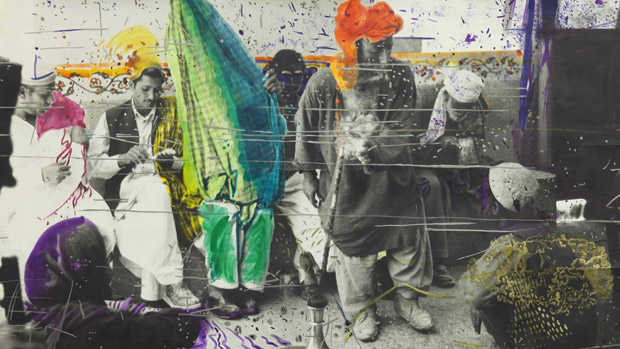Sigmar Polke, Alibis – reviews of 'kaleidoscopic' Tate show
Tate's bewildering romp through Polke's wondrous work is 'essential viewing' for young artists

A free daily email with the biggest news stories of the day – and the best features from TheWeek.com
You are now subscribed
Your newsletter sign-up was successful
What you need to know
A major retrospective of the work of experimental German artist Sigmar Polke, Alibis 1963-2010, has opened at Tate Modern, London. Polke, who died in 2010, is best known for his 1960s Capitalist Realism works responding to American-style Pop art, and for his restless style-shifting and visual jokes.
The show features work spanning Polke's five-decade career including painting, drawing, photography, film, sculpture, notebooks and slide projections. It also showcases his unconventional use of materials ranging from meteor dust to bubble wrap, potatoes and snail juice. Runs until 8 February.
The Week
Escape your echo chamber. Get the facts behind the news, plus analysis from multiple perspectives.

Sign up for The Week's Free Newsletters
From our morning news briefing to a weekly Good News Newsletter, get the best of The Week delivered directly to your inbox.
From our morning news briefing to a weekly Good News Newsletter, get the best of The Week delivered directly to your inbox.
What the critics like
Alibis is "a compendious and at times bewildering romp" through the messy, druggy, unfathomably elusive and wondrous art of Polke, says Adrian Searle in The Guardian. He revelled in mistakes, imperfections and sudden lurches in tempo, material and image where something unexpected breaks in - real magic.
As an artist Polke is "elusive, maddening, unfathomable", and too wriggly be fit into a box called Pop art or Surrealism, says Richard Dorment in the Daily Telegraph. It's best not to overthink it and just enjoy the show as a "giant, constantly shifting kaleidoscope of photos, films and paintings, very much in the spirit of the 1960s".
Polke the offhand, inconsistent, messy trickster "brought magic to disaffection and dissonance, and a lightness of being to conceptual painting", says Jackie Wullschlager in the Financial Times. Over the decades his work liberated many artists, which makes this show "essential viewing" for young painters today.
A free daily email with the biggest news stories of the day – and the best features from TheWeek.com
What they don't like
"Polke's output was so vast and varied that even this huge exhibition can't do him full justice," says Ben Luke in the Evening Standard. And impressive and intriguing as this show is, Polke keeps his audience at arm's length, and seems as confounding as ever.
-
 Political cartoons for February 11
Political cartoons for February 11Cartoons Wednesday's political cartoons include erasing Epstein, the national debt, and disease on demand
-
 The Week contest: Lubricant larceny
The Week contest: Lubricant larcenyPuzzles and Quizzes
-
 Can the UK take any more rain?
Can the UK take any more rain?Today’s Big Question An Atlantic jet stream is ‘stuck’ over British skies, leading to ‘biblical’ downpours and more than 40 consecutive days of rain in some areas
-
 Friendship: 'bromance' comedy starring Paul Rudd and Tim Robinson
Friendship: 'bromance' comedy starring Paul Rudd and Tim RobinsonThe Week Recommends 'Lampooning and embracing' middle-aged male loneliness, this film is 'enjoyable and funny'
-
 The Count of Monte Cristo review: 'indecently spectacular' adaptation
The Count of Monte Cristo review: 'indecently spectacular' adaptationThe Week Recommends Dumas's classic 19th-century novel is once again given new life in this 'fast-moving' film
-
 Death of England: Closing Time review – 'bold, brash reflection on racism'
Death of England: Closing Time review – 'bold, brash reflection on racism'The Week Recommends The final part of this trilogy deftly explores rising political tensions across the country
-
 Sing Sing review: prison drama bursts with 'charm, energy and optimism'
Sing Sing review: prison drama bursts with 'charm, energy and optimism'The Week Recommends Colman Domingo plays a real-life prisoner in a performance likely to be an Oscars shoo-in
-
 Kaos review: comic retelling of Greek mythology starring Jeff Goldblum
Kaos review: comic retelling of Greek mythology starring Jeff GoldblumThe Week Recommends The new series captures audiences as it 'never takes itself too seriously'
-
 Blink Twice review: a 'stylish and savage' black comedy thriller
Blink Twice review: a 'stylish and savage' black comedy thrillerThe Week Recommends Channing Tatum and Naomi Ackie stun in this film on the hedonistic rich directed by Zoë Kravitz
-
 Shifters review: 'beautiful' new romantic comedy offers 'bittersweet tenderness'
Shifters review: 'beautiful' new romantic comedy offers 'bittersweet tenderness'The Week Recommends The 'inventive, emotionally astute writing' leaves audiences gripped throughout
-
 How to do F1: British Grand Prix 2025
How to do F1: British Grand Prix 2025The Week Recommends One of the biggest events of the motorsports calendar is back and better than ever